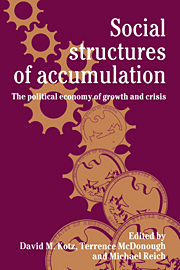Book contents
- Frontmatter
- Contents
- List of contributors
- Introduction
- Part I The theory of social structures of accumulation
- Part II History, institutions, and macroeconomic analysis
- Part III Class, race, and gender
- Part IV The international dimension
- 12 Accumulation and crisis in a small and open economy: the postwar social structure of accumulation in Puerto Rico
- 13 Apartheid and capitalism: social structure of accumulation or contradiction?
- 14 The social structure of accumulation approach and the regulation approach: a US–Japan comparison of the reserve army effect
- 15 The global economy: new edifice or crumbling foundations?
- Afterword: New international institutions and renewed world economic expansion
- Comprehensive bibliography on the SSA approach
- Index
12 - Accumulation and crisis in a small and open economy: the postwar social structure of accumulation in Puerto Rico
Published online by Cambridge University Press: 08 October 2009
- Frontmatter
- Contents
- List of contributors
- Introduction
- Part I The theory of social structures of accumulation
- Part II History, institutions, and macroeconomic analysis
- Part III Class, race, and gender
- Part IV The international dimension
- 12 Accumulation and crisis in a small and open economy: the postwar social structure of accumulation in Puerto Rico
- 13 Apartheid and capitalism: social structure of accumulation or contradiction?
- 14 The social structure of accumulation approach and the regulation approach: a US–Japan comparison of the reserve army effect
- 15 The global economy: new edifice or crumbling foundations?
- Afterword: New international institutions and renewed world economic expansion
- Comprehensive bibliography on the SSA approach
- Index
Summary
Introduction
The mid-1970s' economic slowdown in industrialized economies brought the renewed attention of economists to the long-term determinants of growth. At first, most research on the economic crisis focused on theoretical issues, but, pressed by the political implications of different arguments and by the advent of conservative economics, scholars quickly turned to empirical and historical analyses. Despite the growing research on crisis theory and empirical work, very few scholars have paid attention to the international dimension of the crisis. Although many acknowledge the increasing importance of “countertendencies” pertaining to the global economy, few identify the internationalization of production as a critical element in the crisis. Most theoretical constructs begin with a closed economic system in which long-term profitability largely determines the rate at which the economic surplus is reinvested. In a similar vein, in spite of the fact that empirical research has focused on assessing the factors inducing long-term trends in the profit rate, only very occasionally do international factors play a principal role in such an analysis.
Recent research, however, offers new ground from which to understand the relationship between economic crisis and the globalization of production. The object of this chapter is to develop a model of capital accumulation in a small and open economy considering a high degree of economic integration with a larger and politically powerful country.
- Type
- Chapter
- Information
- Social Structures of AccumulationThe Political Economy of Growth and Crisis, pp. 233 - 252Publisher: Cambridge University PressPrint publication year: 1994
- 1
- Cited by



